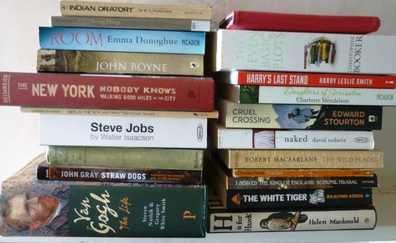 Current book-pile!
Current book-pile! When I was a voraciously-reading child in the 1960s, my mother would buy me a paperback each Saturday morning at the village bookshop. I wasn't really that interested in more toys, apart from my Champion the Wonder Horse. The cost of Penguins at the time ranged from 2 shillings (10p) to 3/6d (17 and a half pence), and my most expensive book was Lord of the Rings, 30 shillings (£1.50) in paperback.
Where else, in the next thirty years or so, could you buy books at less than the fixed retail price? At second-hand bookshops, jumble-sales, latterly boot-sales, and, of course, if you had no spare cash, there were Public Libraries, or the Library Vans for those in rural communities.
What has changed and produced such an enormous over-supply of books?
The International Publishers' Association's Global Fixed Book Price Report, 23rd May 2014 includes the following:
"Fixed book price (FBP) systems have existed for more than 150 years. Most countries with a significant book industry have, at one time or other, introduced a mechanism to fix the price at which books are sold to the public. FBP is viewed by many nations (eg France, Germany) as an important, flexible and effective policy tool in maintaining a sustainable book industry."
"In the 19th century, publishers and booksellers began to set up agreements which fixed the price at which books were to be sold to the public. In 1829, publishers in the United Kingdom applied a price-fixing scheme to combat excessive retailer discounts." (Nothing new there then!) "... In 1900, the UK introduced a Net Book Agreement between publishers and booksellers. As in Germany, it prevented retailers from applying discounts; anyone doing so would no longer be supplied by the publisher in question ... The UK’s Net Book Agreement remained until 1995, when it collapsed following scrutiny by the Office of Fair Trading and the withdrawal of the support of leading publishers and retailers." (Motive? Desire to increase sales at the expense of non-leading publishers and retailers, perhaps?!).
"Supporters of FBP point out that books have a special value in that they are indispensable to our individual development, as well as to society. As objects of culture, they deserve to be treated differently from other tradable commodities. A sustainable book industry, in particular a distribution infrastructure which makes available a wide variety of titles, even in remote areas, should be a matter of national importance. FBP is held to create a level playing field for retailers, allowing small booksellers to survive despite the existence of giant stores. In the absence of FBP, independent booksellers would invariably be at the losing end of price battles with larger stores – eg supermarkets offering bestselling new releases as loss leaders."
According to the report, recent developments indicate that many countries are legislating for a return to forms of FBP, and I was intrigued to read that "while FBP as a topic is considered a non-issue in British politics, the situation may change in Scotland if the country becomes independent following its referendum in September 2014." My Google-search did not reveal any further information on this subject, but I would love to hear from any SNP member or candidate who knows more!
Another change is the proliferation of charity shops - in a nearby town, the much-loved independent bookshop looks in danger of being undermined by the extensive Oxfam Bookshop just a block away, which, to all intents and purposes, is probably even better stocked. There seems now to be a common currency of 50p for most books, even in our local charity shop, where the manager moves donated books on (where? to a book pulper?) after just a month on the shelves. A number of our local shops (including Tesco and Homebase) have 2nd hand books with an honesty box for a charity they are collecting for.
Discounting, particularly in big supermarkets, where you can get the latest top-list paperbacks (the publishers I understand pay shops to feature their books in certain prime spots) for approximately £3 each in many cases. How can writers, publishers, printers, paper manufacturers, bookshops survive, when you are only paying £3, the cost of a coffee at a motorway services, for an item which has taken so much labour and resources to produce, which might give you hours of enjoyment which can be repeated any time you choose to re-read it?
Libraries too are suffering from the book glut. Where will those of us who can't afford even 50p (I have been there in the past) go when they've all shut? Alison Flood reported in The Guardian in December 2014 that the number of branches still open in Britain had fallen 8% since 2009, with visits down 40 million since 2010. Perhaps because people wonder: Why bother with libraries when you can get books cheap everywhere you look?
My reading time is limited, so the last few years my annual average has been about 40 books a year, whereas my sister, who has a regular train commute, gets through a lot more. I've read over 1300 books, but obviously, unless I get a lot more free time or curtail all my other leisure activities (unlikely), I'm going to remain selective about what I buy. But as a book-lover, I find it very hard, with them so cheap and readily available, not to buy buy buy! Also, I want to support our libraries, so I try to remember to regularly to get books out. I like reading poetry, and our local branch of Waterstones had a very narrow selection last time I looked, but my most recent visit to our tiny Southborough Library yielded a nice haul of Jackie Kay, Seamus Heaney, and John Hegley!
Finally, for independent authors, like my husband M J Johnson, there is always the problem, in the absence of mass-marketing, of getting people to find and read your work. One of the tools these authors use is book promotions and give-aways, but even this doesn't always yield result; some readers appear to simply collect books to add to their war-chest of literally thousands of unread volumes!
Save our libraries and bookshops! Bring back the fixed price! They still have it in Germany, and there are beautiful, thriving book-shops there that offer a far wider and more diverse range of books than what we're used to seeing on our own high streets!
Links:
http://www.internationalpublishers.org/images/reports/2014/fixed-book-price-report-2014.pdf
http://www.theguardian.com/books/2014/dec/10/library-usage-falls-dramatically-services-visits-down-40m

 RSS Feed
RSS Feed
